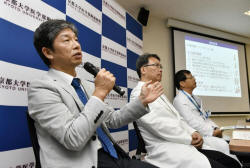|
 Japan
scientists to use 'reprogrammed' stem cells to fight
Parkinson's Japan
scientists to use 'reprogrammed' stem cells to fight
Parkinson's
 Send a link to a friend
Send a link to a friend
[July 30, 2018]
TOKYO (Reuters) - Japanese scientists said
on Monday they will start clinical trials next month on a treatment for
Parkinson's disease, transplanting "reprogrammed" stem cells into
brains, seeking a breakthrough in treating the neurodegenerative
disorder.
|
|
 Parkinson's is caused by a lack of dopamine made by brain cells and
researchers have long hoped to use stem cells to restore normal
production of the neurotransmitter chemical. Parkinson's is caused by a lack of dopamine made by brain cells and
researchers have long hoped to use stem cells to restore normal
production of the neurotransmitter chemical.
The clinical trials come after researchers at Japan's Kyoto
University successfully used human induced pluripotent stem cells (iPS)
to restore functioning brain cells in monkeys last year.
So-called iPS cells are made by removing mature cells from an
individual - often from the skin or blood - and reprogramming them
to behave like embryonic stem cells. They can then be coaxed into
dopamine-producing brain cells.

"This will be the world's first clinical trial using iPS cells on
Parkinson's disease," Jun Takahashi, professor at Kyoto University's
Centre for iPS Cell Research and Application, told a news
conference.
The center is headed by Shinya Yamanaka, who in 2012 shared a Nobel
Prize for medicine with a British scientist, John Gurdon, for the
discovery that adult cells can be transformed back into embryo-like
cells.
[to top of second column] |

"We intend to carry on conducting our research carefully, yet
expeditiously, in coordination with Kyoto University Hospital, so
that new treatment using iPS cells will be brought to patients as
soon as possible," Yamanaka said in a statement.
The fact that the clinical trial uses iPS cells rather than human
embryonic cells means the treatment would be acceptable in countries
such as Ireland and much of Latin America, where embryonic cells are
banned.
Sumitomo Dainippon Pharma Co Ltd has said it aims to manufacture and
start selling cellular medicine based on the data from the clinical
trials by the year ending March 2023.
The company said, however, the target is solely its own and not a
shared goal with Kyoto University.
(Reporting by Kiyoshi Takenaka; Editing by Nick Macfie)
[© 2018 Thomson Reuters. All rights
reserved.] Copyright 2018 Reuters. All rights reserved. This material may not be published,
broadcast, rewritten or redistributed.
Thompson Reuters is solely responsible for this content. |